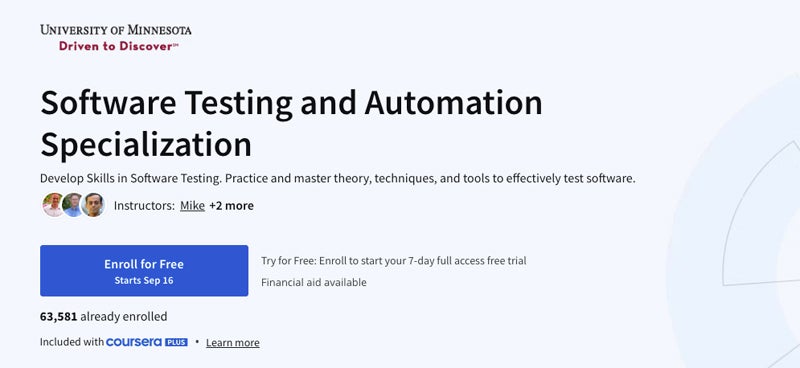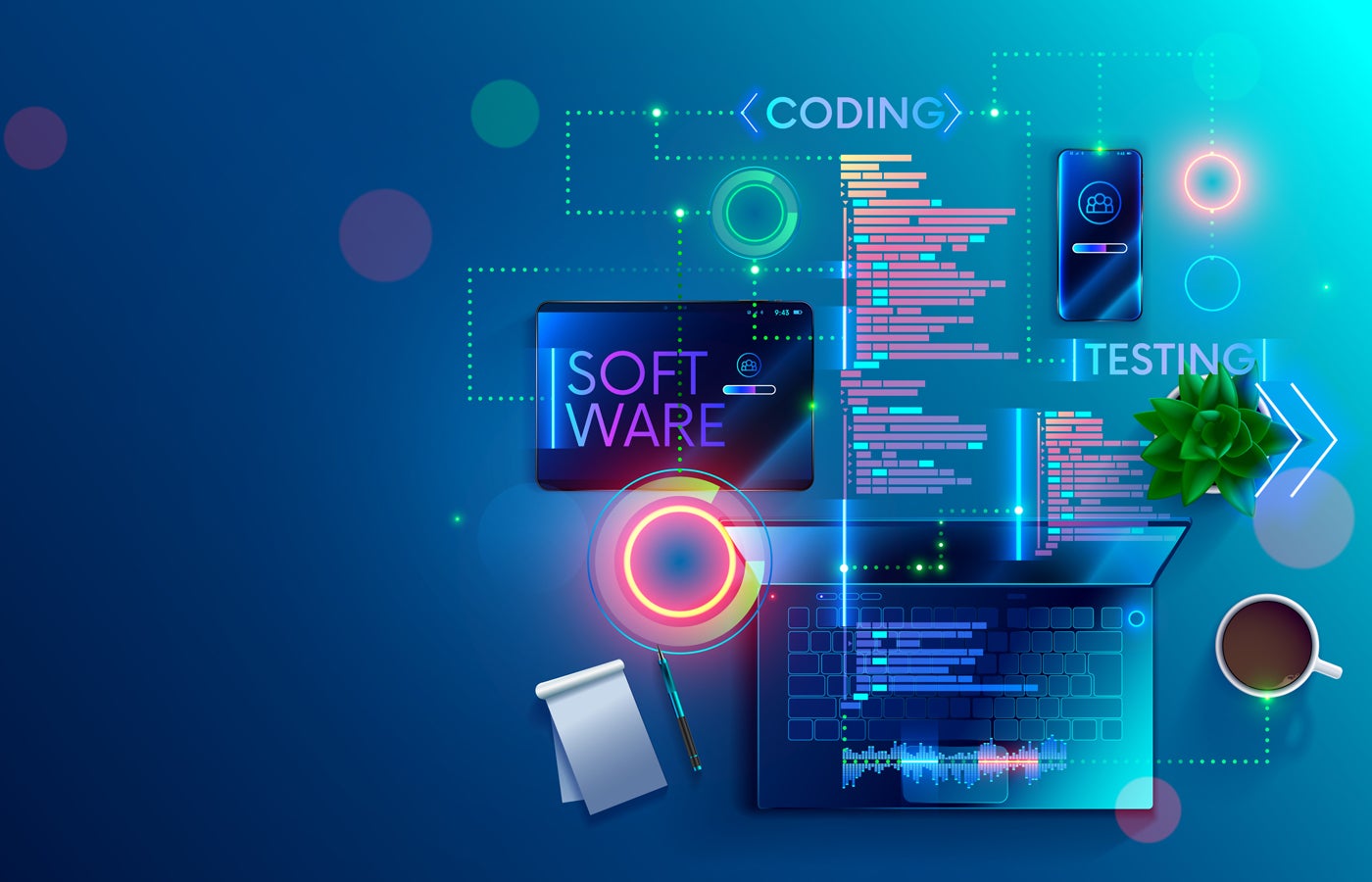- Best software testing courses: Comparison table
- Foundations of Software Testing and Validation – Coursera: Best for beginners (overview)
- The Complete 2024 Software Testing Bootcamp – Udemy: Best for beginners (in-depth)
- Software Testing and Automation Specialization – Coursera: Best for developers
- Automated Testing – End to End – Pluralsight: Best for automating testing
- Rest API Testing (Automation) from Scratch-Rest Assured Java – Udemy: Best for API testing
- ISTQB Foundation Level (CTFL) V4.0 updated 2024 – Udemy: Best for certification
- What are the differences between manual and automated software testing courses?
- What career opportunities can you pursue with a certificate in software testing?
- What are the two main types of methodologies of software testing?
- Methodology
Software testing is crucial for businesses with any kind of digital presence. By finding bugs, security holes, and performance issues before software goes out into the wild, companies keep apps running smoothly and avoid reputational damage.
However, as developer teams are busy building new features, dedicated software testers, also known as quality assurance analysts, are needed. Testers dig deep into apps, running both manual and automated tests to break features, expose bugs, check security, and ensure everything works across different environments and conditions.
According to the U.S. Bureau of Labor Statistics, the demand for software developers, QA analysts, and testers will grow by 17% between 2023 and 2033 — much faster than the average for all occupations. But only 16% of businesses think their current testing practices are efficient, and the proliferation of AI apps is exacerbating the issue.
The good news is you don’t need to be a coding whizz to start a career in software testing — beginners can pick up the basics and land an entry-level role. But if you’re already a professional or hobbyist developer, learning testing skills can help you catch issues in your own code before it hits production.
If you’re interested in delving into software testing for the first time or are a developer that wants to expand your skills, consider enrolling in an appropriate online course. TechRepublic takes a look at the top six software testing courses available in 2024 for learners with different experiences, goals, and budgets.
SEE: JetBrains State of Developer Ecosystem 2023: Automated Testing Wins
Best software testing courses: Comparison table
Foundations of Software Testing and Validation – Coursera: Best for beginners (overview)
“Foundations of Software Testing and Validation” is a short course designed by the University of Leeds to provide learners with a brief overview of the field. While it does not get into the nitty-gritty of the subject, the course does allow those with an interest in the subject to check their understanding and gauge whether they want to lend their time to a more in-depth course of learning. In a series of videos, readings, and quizzes, the course covers the main types of software testing, industry-standard test cases, bugs, and static code analysis tools.
Price
$59/£38.
Duration
Five hours.
Pre-requisites
None.
Skills taught
Software testing concepts, Software Development Life Cycle, dynamic testing, boundary value analysis, equivalence partitioning.
Pros and cons
| Pros | Cons |
|---|---|
|
|
The Complete 2024 Software Testing Bootcamp – Udemy: Best for beginners (in-depth)

This Udemy course is intended for individuals new to software testing but want to reach a level where they are ready to apply for entry-level quality assurance jobs. It starts with the basic concepts of software testing and the roles before moving into how to write and execute a test case, API testing, performance testing, and test automation. At the end of the course, there are sessions on writing a CV, freelance testing websites, and advice for becoming ISTQB certified. The course is regularly updated and often discounted.
Price
$124.99/£59.99.
Duration
33.5 hours.
Pre-requisites
None.
Skills taught
Software testing concepts, black-box test techniques, white-box test techniques, Testlink, API testing, Agile testing report writing.
Pros and cons
| Pros | Cons |
|---|---|
|
|
Software Testing and Automation Specialization – Coursera: Best for developers

“Software Testing and Automation Specialization,” prepared by the University of Minnesota, is intended for early-career software developers looking for a relevant introduction into software testing. It goes more in-depth than the beginner courses, teaching how to write functional tests for front-end and back-end code, measuring their effectiveness, automation, and app testing. By the end, learners will feel confident in developing tests for their own software that meet industry standards.
Price
$59/£30 a month after a seven-day free trial.
Duration
80 hours.
Pre-requisites
Experience with an object-oriented programming language (preferably Java).
Skills taught
Unit testing, testing automation, static analysis, white-box testing techniques, black-box testing techniques.
Pros and cons
| Pros | Cons |
|---|---|
|
|
Automated Testing – End to End – Pluralsight: Best for automating testing

If you are a developer feeling bogged down by manual testing processes or just wants to learn how to properly apply automated tests to your software, then this may be the course for you. End-to-end automated testing ensures quicker detection of defects compared to manual testing, which is more prone to human error. In just three hours of content, writer and developer Jason Roberts covers how and what to test at the unit, integration, and functional UI levels before putting it all together with continuous integrations in a TeamCity server.
SEE: Software tests are essential in improving quality, but most developers aren’t automating them
Price
$29/£24 a month after a ten-day free trial.
Duration
Three hours.
Pre-requisites
While there are no specific pre-requisites for this course, it is intended for software developers rather than complete beginners.
Skills taught
Automated testing principles, integration testing, functional UI testing, unit testing, TeamCity.
Pros and cons
| Pros | Cons |
|---|---|
|
Rest API Testing (Automation) from Scratch-Rest Assured Java – Udemy: Best for API testing

REST, Representational State Transfer, is a software architectural style that underpins the majority of web services today. “Rest API Testing (Automation) from Scratch” teaches how to automate the testing of APIs within the REST architecture, assuming no prior knowledge. The course covers setting up a testing framework from scratch with Java, TestNG, and Maven, and integrating it with tools like Jenkins for continuous integration. It provides hands-on practice with live API examples, including Google Maps, and covers advanced topics, including OAuth 2.0 and serialization.
Price
$149.99/£59.99.
Duration
24.5 hours.
Pre-requisites
None.
Skills taught
REST API automation, JIRA APIs, Google APIs, serialization, deserialization, Jenkins, GraphOL, Excel, Java.
Pros and cons
| Pros | Cons |
|---|---|
|
|
ISTQB Foundation Level (CTFL) V4.0 updated 2024 – Udemy: Best for certification

The International Software Testing Qualifications Board, ISTQB, is a globally-recognised certification body for software testers, and the ISTQB Foundation Level is the entry-level certification. This Udemy course aims to prepare those looking to get an industry-relevant certification for the ISTQB Foundation Level exam. It covers the most up-to-date syllabus, which includes the fundamentals of software testing, test design techniques, test reporting, and common test tools. The instructor also claims that those who have completed the course have passed the certification exam on their first attempt.
However, completing this course does not provide the ISTQB certification, as that can only be acquired through an accredited exam provider.
Price
$129.99/£79.99.
Duration
Eight hours.
Pre-requisites
Basic understanding of software lifecycle and programming recommended.
Skills taught
Fundamentals of software testing, Software Development Life Cycle (SDLC), static testing, test analysis and design, Test management, test tools.
Pros and cons
| Pros | Cons |
|---|---|
|
|
What are the differences between manual and automated software testing courses?
Manual testing courses focus on teaching how to manually execute test cases without tools. These typically do not require any prior programming knowledge as they start from the very basics, so are best for beginners.
Automated testing courses, such as Pluralsight’s Automated Testing: End to End, focus on using tools and scripting to automate software tests. These are ideal for those aiming to speed up repetitive testing tests and work in an existing engineer role.
In a manual software testing course, you may learn how to test that an online shopping cart is working properly by manually checking if items are added or removed correctly and that the total price updates after each addition. In an automated testing course, you might learn how to write a script that automates adding items to the cart and checking the total price and does so across different browsers.
SEE: The 5 Best Machine Learning Courses for 2024
What career opportunities can you pursue with a certificate in software testing?
A certificate in software testing, or simply knowledge gained by a relevant course, can open more doors than one may think. Career options include:
- Software test engineer: Responsible for designing and executing test cases to find bugs and ensure software quality before release. Average annual salary: $128,721.
- Quality assurance (QA) analyst: Focuses on monitoring the entire software development process to improve product quality through testing. Average annual salary: $113,079.
- Performance tester: Tests speed, stability, and scalability of applications when under load. Average annual salary: $111,321.
- Project manager: Oversees the testing process, manages test teams, and ensures that all testing activities align with project goals and timelines. Average annual salary: $89,094.
SEE: How to Become a Project Manager in 2024
What are the two main types of methodologies of software testing?
Software testing methodologies are the different approaches used to evaluate the functionality, performance, and quality of software. These include system testing, performance testing, and usability testing. But the most prevalent are unit testing and integration testing.
Unit testing involves individual components of an application being tested in isolation to ensure they work as expected. It focuses on verifying the smallest testable parts of the software without any dependency on external systems. Integration testing, on the other hand, verifies the interaction between different components after they’ve been combined. The goal is to ensure that integrated units work together correctly.
SEE: Load testing vs Stress testing: What are the differences?
Methodology
When assessing online courses, we examined the reliability and popularity of the provider, the depth and variety of topics offered, the practicality of the information, the cost, and the duration. The courses and certification programs vary considerably, so be sure to choose the option that is right for your goals and learning style.




